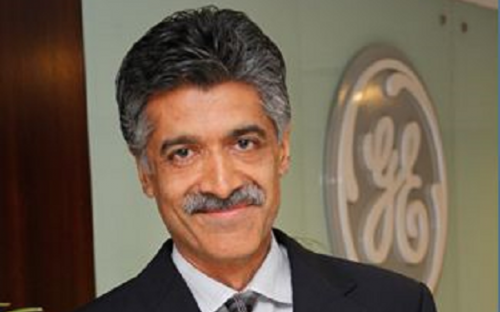As GE pushes for growth in emerging markets, the firm is looking for Experienced Commercial Leaders who can understand the full range of the firm’s products; its clients, which could be anything from a mining contractor in Indonesia to a health authority in India; and its outcome-based selling approach.
Vishal Wanchoo is Vice President, Commercial Growth Leader in GE’s Global Growth Organization. The Global Growth Organization leads the way in finding growth opportunities and client solutions worldwide. Vishal is based in Gurgaon, India, but covers all emerging markets.
Vishal joined GE in 1997 to run GE Healthcare IT, a business that was part of GE Healthcare. He was on a steep learning curve, learning about GE, and integrating and growing the new business. Within 10 years, GE Healthcare IT grew from $30m to $1b in revenue — an experience that was as challenging as it was rewarding.
His next career step was to join the Global Growth Organization in 2011, and move to India. As Growth Leader for India he was covering all GE’s businesses and operating for the first time outside the US. “It set me up for the role I’m currently in,” he says.
We asked Vishal what GE looks for in Commercial Leaders, and the key trends that MBAs should be aware of when they apply to the firm.
Tell us about what you do as Vice President, Commercial Growth Leader? What does your role involve day to day?
We have 12 regions outside of the US, and the strategy for the Global Growth Organization is to drive growth across the 12 regions. GE is pushing to accelerate global growth: over 60% of our business is now outside the US. We have a Global Growth Team in every region and our task is to clearly understand the market, and define opportunities for growth.
First, we want to provide clarity to our businesses on what market opportunities exist.
Second, we want to ensure that we’re making the right investments in terms of our localization and commercial footprint, and that we’re not missing any opportunities.
Third, we want to make sure that we are making decisions close to where our customers are: are we making the right decisions locally if they can be made locally? To be responsive to our customers, we don’t want everything funnelled back to headquarters.
In a company operating in so many different industries and countries, what are the core skills and abilities that commercial leaders need?
I would say three things.
First, commercial skills: the ability to connect with customers and articulate their needs back to the businesses, and to understand how our products and solutions can solve customer pain points
Second, they need to be comfortable with all the digital tools that support contemporary selling, and be comfortable operating in a digital world
Third, we emphasise outcome-based selling. Instead of thinking about product features, we want commercial teams to think about what we can do to make our customers’ businesses work more efficiently.
We have started to develop training on outcome-based selling, and also for our teams to understand our digital strategy.
Do you work with any ECLP leaders?
I interact with ECLP teams in different regions. Just recently I was in Cairo and met with an ECLP team from the US, which will be there for a few months. It’s a new concept: to send teams of ECLPs on assignments to understand the landscape, point to where we should be investing and what the opportunities are.
What do MBA grads bring to GE?
[An] MBA teaches you some skills which are very important. MBAs have strong financial and marketing skills compared to people with a technical background.
Of course all commercial leaders need a good understanding of our industrial businesses within GE, but you don’t need an engineering degree. For example, if you’re selling power generation equipment you need to understand the principles of how a gas turbine works. But what’s most important is to understand our customer economics and how we can improve their returns.
I don’t have an MBA myself. I did a Master’s in Computer Engineering [at the University of Southern California]. Prior to GE, I was in an engineering function in Bayer for seven or eight years, and then switched to product management and marketing, and then to business management. I developed my commercial skills through significant time in the field working and interacting with customers at all levels. I do think an engineering degree and an MBA is a fantastic combination.
What are the big trends affecting GE's business, that aspiring Commercial Leaders should know about?
Four themes cut across the company:
1. Leadership in technology
We need to understand how our technology impacts customer economics and returns.
2. Globalization
This is about understanding the global landscape and trends: governments play an increasingly important role everywhere we do business.
3. Services and analytics and outcome selling
From a commercial standpoint, analytics, big data and outcome selling is very important. It’s an evolution: not every customer will want to think and buy that way, but this is a trend that is increasingly important.
4. Simplification
We are trying to drive local decisions and accountability.
What advice would you give to an MBA grad who wants to work in GE India? What should he or she expect?
There is a dire need for infrastructure in India, but on the flip side accessibility to capital and getting things done are more difficult with the bureaucracy that exists.
I’d advise MBAs to think about how they can make projects move through the lifecycle of procurement faster. It’s not about technology alone. You have to partner with your customer in a bigger way here and think beyond product…project development, project financing, project structuring, etc.
RECAPTHA :
d1
a0
83
b9







